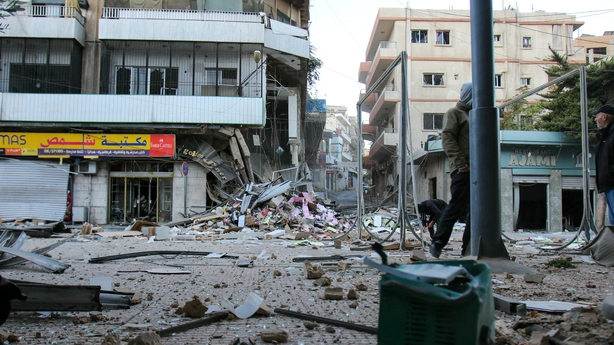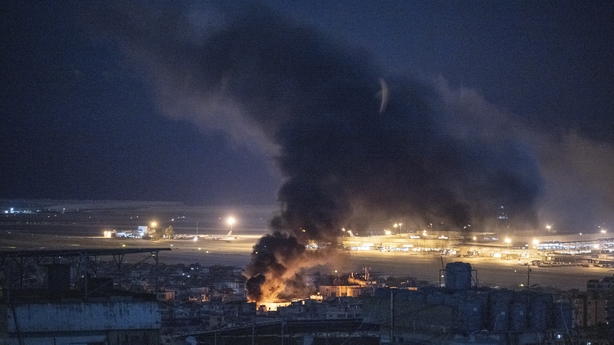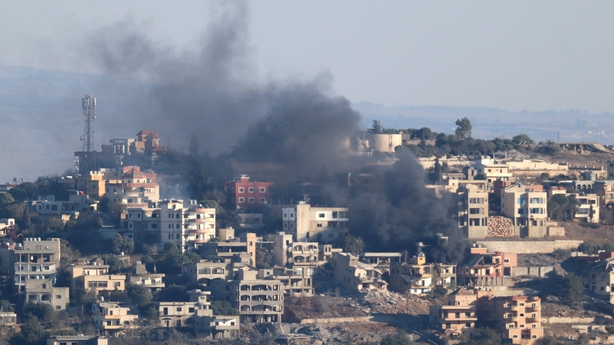Four people have been killed and 24 injured after an Israeli strike hit an area near Beirut's Rafik Hariri University Hospital, the Lebanese health ministry has said.
The ministry said a child was among the four people killed in the strike.
A hospital source said that it appeared the strike hit the hospital's parking lot.
The hospital is the main public hospital in the city.
The Israeli military had earlier issued several evacuation orders for Beirut's southern suburbs.
Lebanese state media reported an Israeli strike on the Ouzai neighbourhood of south Beirut.
"An Israeli air strike targeted the Ouzai area. This is the first targeting of the Ouzai district since the start of the Israeli aggression on Lebanon," the National News Agency said.
Earlier, the Israeli army said its forces were pummelling Hezbollah's financial arm, hitting more than two dozen targets including a bunker with tens of millions of dollars in cash and gold.
The strikes since last night mark an expansion of Israel's campaign against the group after a year of cross-border exchanges that escalated in late September into a full-blown war.
Israeli forces are now seeking to degrade the Shia Muslim movement's ability to fund its operations
"The Israeli Air Force carried out a series of precise strikes on these Hezbollah financial strongholds," military spokesman Rear Admiral Daniel Hagari said in a televised briefing.
"One of our main targets last night was an underground vault with tens of millions of dollars in cash and gold. The money was being used to finance Hezbollah's attacks on Israel."
He did not specify whether all of the money was destroyed by the strike.

The Israeli military said it will carry out more strikes targeting Hezbollah and its financial network in Beirut and throughout Lebanon.
Meanwhile, Hezbollah said that it had launched rockets at an army intelligence base in the suburbs of the main Israeli city of Tel Aviv.
Hezbollah fighters launched "quality rockets" at "the Glilot base of the Military Intelligence Unit 8200 in the Tel Aviv suburbs," the group said, adding the attack was "in defence of Lebanon," "in response to Israeli aggressions" and dedicated to their slain leader Hassan Nasrallah.
It comes after US special envoy Amos Hochstein said in Beirut that the United States is working on a formula to end the conflict between Israel and Lebanese armed group Hezbollah for good, and that merely committing to a previous UN resolution would not be enough.
UN resolution 1701, which ended the last round of conflict between Israel and the Lebanese militant group Hezbollah in 2006, calls for southern Lebanon to be free of any troops or weapons other than those of the Lebanese state.
Hezbollah did not end its presence, however.
Continued cross-border tensions culminated in Hezbollah missile attacks on northern Israel in support of the Palestinian militant group Hamas after it staged a bloody killing spree in Israel from Gaza just over a year ago.
Israel began a large-scale onslaught on Hezbollah last month.
Mr Hochstein, visiting Lebanon for the second time in two months, is holding talks with Lebanese officials in a new US mediation push to bring peace to the Middle East after Israel killed Hamas leader Yahya Sinwar last week.
"Both sides simply committing to (UN resolution) 1701 is not enough," Mr Hochstein told a press conference.
While the resolution remained as a basis for ending the conflict, additional measures were needed to ensure it was implemented "fairly, accurately and transparently".
"We are working with government of Lebanon, the state of Lebanon, as well as the government of Israel to get to a formula that brings an end to this conflict once and for all," he said.
Israel's assault on Hezbollah has raised fears of a wider regional conflict between Israel and Hezbollah's patron, Iran.
Read more: Tánaiste praises food, water refill for UNIFIL troops
Israel overnight attacked sites in Beirut, southern Lebanon and the Bekaa valley that it said are used by Hezbollah to finance its operations.
Hundreds of families fled homes near the targeted locations ahead of the strikes, with no casualties reported.
Israel has reportedly given the United States a document with its conditions for a diplomatic solution to end the war in Lebanon, Axios has reported, citing two US officials and two Israeli officials.
Israel has demanded its forces be allowed to engage in "active enforcement" to make sure Hezbollah does not rearm and rebuild its military infrastructure close to the border, Axios reported, citing an Israeli official.
Israel also wants its air force to have freedom of operation in Lebanese airspace, the report added.
A US official told Axios it was highly unlikely that Lebanon and the international community would agree to Israel's conditions.
Speaker Berri told the Al-Arabiya broadcaster over the weekend said that he would reject any amendments to United Nations resolution 1701.

Meanwhile, the US military rushed its advanced anti-missile system to Israel and it is now "in place", US Defense Secretary Lloyd Austin said during a trip to Kyiv.
Mr Austin declined to say whether the Terminal High Altitude Area Defence system, or THAAD, was operational. But he added: "We have the ability to put it into operation very quickly and we're on pace with our expectations."
Cross-border fighting between Israel and Hezbollah erupted a year ago when the group began launching rockets in support of Palestinian militant group Hamas in Gaza.
At the start of October, Israel launched a ground assault inside Lebanon in an attempt to stabilise the border region for its citizens who had fled rocket attacks in northern Israel.
It has also assassinated senior Hezbollah figures, including its veteran leader Hassan Nasrallah who was killed in an airstrike in Beirut's southern suburbs.
The US and regional powers have tried for a year to secure a ceasefire in Gaza but the efforts have been unsuccessful, leaving Lebanese officials and many diplomats sceptical about the chances for a truce in Lebanon.

Israel has intensified its military campaigns both in Gaza and Lebanon, days after the killing of Hamas leader Yahya Sinwar raised hopes of an opening for ceasefire negotiations to end more than a year of conflict.
With US elections approaching, officials, diplomats and other sources in the region say Israel is seeking through military operations to try to shield its borders and ensure its rivals cannot regroup.
Israel is also preparing to retaliate for an Iranian missile barrage earlier this month, though Washington has pressed it not to strike Iranian energy facilities or nuclear sites.
Hamas-led militants killed 1,200 people and took 250 hostages in the attack on Israel on 7 October 2023 that sparked the war in Gaza, according to Israeli tallies.
Israel's military response in Gaza has left more than 42,500 people dead, has made most of Gaza's 2.3 million people homeless and demolished most of the territory, Palestinian officials say.
Over the last year, Lebanese officials estimate that more than 2,400 people have been killed and more than 1.2 million people displaced in Lebanon.
Fifty-nine people have been killed in northern Israel and the occupied Golan Heights over the same period, say Israeli authorities.

